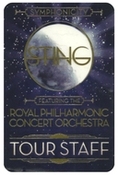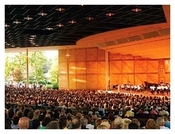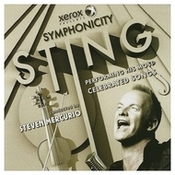
Sting's string show at Ravinia a lavish take on his hits...
The image playing on the video screen behind the orchestra was from the silent horror movie 'Nosferatu', but the shimmering strings and descending brass were indebted to Alfred Hitchock film scores as Sting sang from the perspective of a vampire on 'Moon Over Bourbon Street'.
It was the most audacious moment of his performance with the Royal Philharmonic Concert Orchestra at the Ravinia Festival Saturday, and the concert could have used more like it. Instead, the first of Sting's two sold-out Ravinia shows this weekend--which ran two hours and 45 minutes with an intermission--was more lavish than it was inspired.
Sting's foray into classical music marks the latest and probably inevitable musical turn for the artistically ambitious and high-minded 58-year-old singer, who previously has dabbled in jazz and world music while leading the Police and during his solo career. In the past few years he's released a record of Elizabethan-era lute songs and appeared in a theatre production about the composer Robert Schumann.
The concert followed last week's release of 'Symphonicities', a recording of Sting singing some of his old songs with orchestral accompaniment. Inspired by his benefit performance two years ago with the Chicago Symphony Orchestra, Sting undertook the project with the help of a bevy of arrangers, the Royal Philharmonic, a large British ensemble, and conductor Steven Mercurio. Throughout the concert, a four-man combo, including members of Sting's regular solo band, added globe-spanning rhythms and rippling acoustic guitar.
With one glaring exception - a clumsy rendition of 'Next to You' that found him yelping over manically sawing strings - Sting wisely avoided trying to recreate his rock performances. Instead, the best moments allowed the orchestra to transform the songs, as the staccato guitar riff of 'Roxanne' was replaced by eddying strings that suggested a waterfront at nighttime, and the country death song 'I Hung My Head' drew on Aaron Copland's evocations of the American West.
Much of the time, though, the arrangements were just more sumptuous versions of the original song's accompaniment, particularly when it came to big hits like 'Every Little Thing She Does Is Magic' and 'King of Pain'' To his credit, Sting took advantage of the format to dig into lesser-known corners of his songbook as well such as 'The End of the Game', but they often left the orchestra providing an elaborate backdrop to the songs rather than melding with them.
Although Sting's voice was a bit shrill as he reached for his high notes (even after transposing some songs to a lower register), his glowering tone and punchy intonation were as formidable as ever, and vocalist Jo Lawry added plaintive harmonies, particularly on 'My Ain True Love'.
Sting has given some detached performances over the years, but he was at his most personable as he explained his songs' origins, and his enthusiasm for his undertaking was evident in his acknowledgements of the orchestra and its soloists. If he could make better use of them, he might be on to something.
(c) The Chicago Tribune by Kevin McKeough
July 17, 2010
SET LIST
- If I Ever Lose My Faith In You
- Englishman In New York
- Every Little Thing She Does Is Magic
- Roxanne
- Straight To My Heart
- When We Dance
- Russians
- I Hung My Head
- Shape Of My Heart
- Why Should I Cry For You?
- Whenever I Say Your Name
- Fields Of Gold
- Next To You
- A Thousand Years
- Tomorrow We'll See
- Moon Over Bourbon Street
- End Of The Game
- You Will Be My Ain True Love
- All Would Envy
- Mad About You
- King Of Pain
- Every Breath You Take
- Desert Rose
- She's Too Good For Me
- Fragile
- I Was Brought To My Senses






